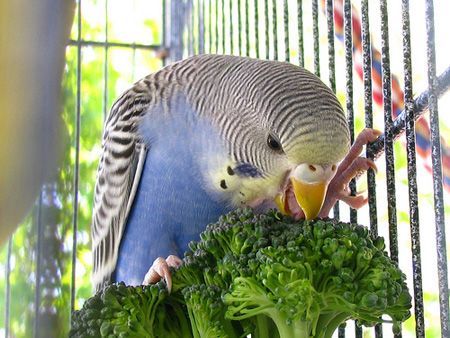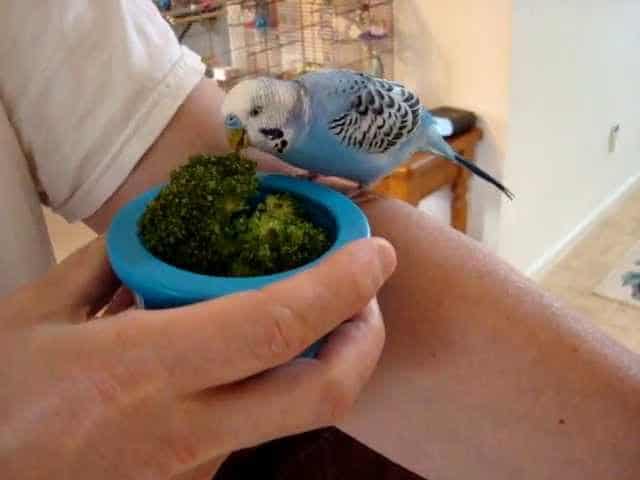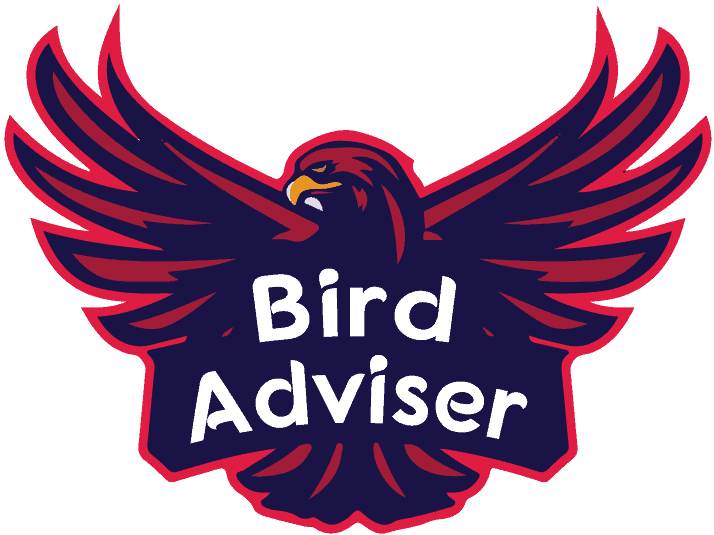Yes, parakeets can indeed eat broccoli as part of their diet.
This nutritious vegetable offers a range of health benefits for these birds.
Broccoli is rich in essential nutrients like vitamin C, which supports the immune system, and vitamin K, which is important for blood clotting and bone health.
Moreover, the dietary fiber in broccoli aids in digestion.
To incorporate broccoli into a parakeet’s diet, it’s advisable to wash it thoroughly, cut it into manageable pieces, and serve it either steamed or raw.
It’s essential to refrain from adding any seasonings, as plain broccoli is best for these birds.
While introducing new foods gradually, including broccoli can contribute to a diverse diet that includes seeds, pellets, and other fresh vegetables.
As with any dietary change, observing your parakeet’s response is important to ensure it agrees with their digestive system.
Providing a balanced assortment of foods helps maintain their overall health and well-being.
If ever in doubt, consulting with an avian veterinarian can offer tailored guidance for your parakeet’s dietary needs.

Is Broccoli Healthy For Parakeets?
It is believed that fresh broccoli that hasn’t been processed yet is always better to give to a parakeet.
A lot of people believe that frozen vegetables tend to retain more nutrition because they are kept frozen right after they are harvested from the fields.
Broccoli is healthy for parakeets in both ways, and it’s up to the owner how he wants to serve the broccoli to his little fellow.
Broccoli Nutritional Values
Following is the nutritional value list in a table for the broccoli.
| Nutrients | Quantity |
| Energy | 30.9 Calories |
| Vitamin C |
81.2 mg
|
| Vitamin E |
0.7 mg
|
| Niacin | 0.6 mg |
| Riboflavin |
0.1 mg
|
| Vitamin A |
567 IU
|
| Thiamin | 0.1 mg |
| Sodium |
30.0 mg
|
| Potassium | 288 mg |
| Calcium |
42.8 mg
|
| Iron |
0.7 mg
|
| Magnesium |
19.1 mg
|
| Phosphorous |
60.1 mg
|
| Zinc |
0.4 mg
|
| Carbohydrates |
21.9 g
|
| Protein |
6.3 g
|
| Dietary fibers |
2.4 g
|
Source: nutritiondata.self.com
Nutritional Values Benefits
Broccoli is a great food that is low in calories and contains lots of nutrition.
The dietary advantages that broccoli contains are very crucial in building a strong lifestyle for a parakeet.
- Wild parakeets can get vitamin D by consuming broccoli. It is abundant in vitamin D, making it equally suitable for taking vitamin D from the sun.
- It is rich in vitamin K, which proves to be very fundamental for growing stronger bones and a better digestive system.
- Broccoli controls blood calcium levels.
- For parakeets, it can also be a huge skin supplement that helps with the good health of the eyes.
- Vitamin B in broccoli helps a parakeet to control its emotions and depression.
- It is also very good for keeping up a strong and healthy body as well as the skeletal structure of a parakeet that allows him to stay active throughout the day.
How Often Can Parakeets Eat Broccoli?
Broccoli can be fed to parakeets very often.
It is a good and healthy vegetable, so you can consider giving it to a parakeet one day after or more than 2 days after.
Don’t make it a regular diet for the parakeet because it may affect its health at any stage.
Consider giving boiled broccoli to your parakeet in case you are scared to give raw broccoli to your pet.
Boiling broccoli burns up to 90% of the supplements in this vegetable.
Broccoli contains a more elevated level of supplements.
Some water-solvent nutrients can be lost in the cooking water so that it won’t be too heavy for the parakeet to consume.
By getting crude broccoli, your bird will get a greater amount of nutrients A and D.
Crude broccoli is suitable and beneficial for parakeets to consume.
The parakeets can rely on both raw broccoli as well as frozen broccoli too.
Both have their own benefits, so you don’t have to worry as it won’t hurt your little pet.
Don’t give frozen broccoli directly, as you will need to defrost it first to a suitable temperature and then let your parakeet eat it.
How to Feed Broccoli to Parakeets?
You can spend your day cutting food for your little bird, which is easier for the parakeet to consume, but it will be time taking for you.
Spending hours on slicing broccoli can be tiresome, so consider giving pieces of broccoli by your hand to your parakeet would be a quicker and faster idea that would also spare some food in case your budgie gets fed up eating it.

You can either spread pieces of broccoli in your parakeet’s cage, or you can hand feed your parakeet with broccoli pieces.
Hand-feeding develops a good and better relationship of understanding between a parakeet and the pet, so it’s a preferred way.
The rest is on the parakeets; they pick the pieces from their feet and nibble on them through their beak to feed on them quietly.
They love veggies so much, and broccoli might be one of their favorite vegetables.
How Many Broccoli Should I Feed My Parakeet?
Consider giving a limited and suitable quantity of broccoli to your parakeet as a healthy food item should be given out of moderation.
It can lead to bad health issues for a pet.
So always try to give one serving of broccoli at a time to your parakeet.
In case your parakeet doesn’t like broccoli or is fed up with it, then you can consider trying to go for a few alternatives.
There are various food and fruit items to choose from in order to feed your parakeet.
Alternative Food
Here are a few suggestions for food items that include vegetables and fruits that your parakeet can eat without a problem.
Conclusion
In conclusion, the inclusion of broccoli in a parakeet’s diet can be a beneficial and nutritious choice.
This versatile vegetable, brimming with vitamins and minerals like vitamin C and vitamin K, can provide essential health support for these beloved birds.
However, it’s crucial to approach this addition thoughtfully and responsibly.
Proper preparation, such as washing and appropriately cutting the broccoli, ensures safety and ease of consumption.
The absence of seasonings and additives guarantees the purest and healthiest offering.
As part of a varied diet that includes seeds, pellets, and other fresh vegetables, broccoli can contribute to the overall well-being of parakeets.
Yet, individual reactions can vary, so a watchful eye on their response is essential.
In the journey to provide the best care for our feathered companions, consulting an avian veterinarian for tailored guidance can further enhance our understanding of their dietary needs.
With proper attention, parakeets can enjoy the benefits of broccoli while thriving on a well-balanced and nutritious diet.
FAQ
What nutrients does broccoli offer to parakeets?
Broccoli is rich in nutrients such as vitamin C, which supports the immune system, and vitamin K, important for blood clotting and bone health. It also contains dietary fiber that aids in digestion.
How should I prepare broccoli for my parakeet?
Wash the broccoli thoroughly to remove any contaminants. Cut it into small, manageable pieces that your parakeet can handle. You can serve it either steamed or raw, but avoid adding any seasonings or additives.
Can broccoli be the main food for my parakeet?
No, broccoli should not be the main food for your parakeet. Parakeets require a balanced diet that includes a variety of foods such as seeds, pellets, fresh vegetables, and occasional fruits. Broccoli can be a healthy addition to this mix.
How much broccoli can I give to my parakeet?
Offer broccoli in moderation. A few small pieces a couple of times a week is a good starting point. Always monitor your parakeet’s reaction to new foods to ensure it agrees with their digestive system.
Can parakeets eat both raw and cooked broccoli?
Yes, parakeets can eat both raw and cooked broccoli. Some parakeets might prefer the texture of raw broccoli, while others may find steamed broccoli easier to digest.
Last Updated on August 21, 2023 by Lily Aldrin
